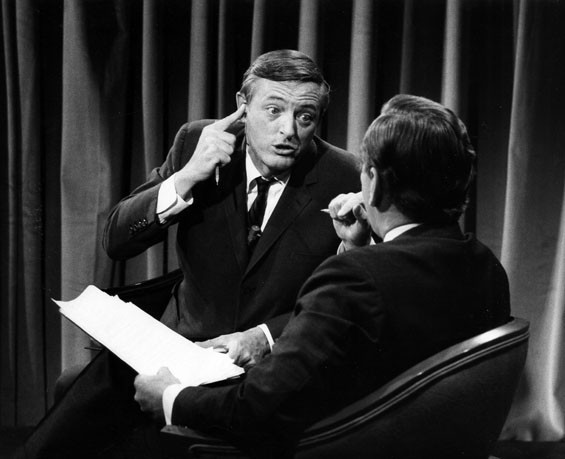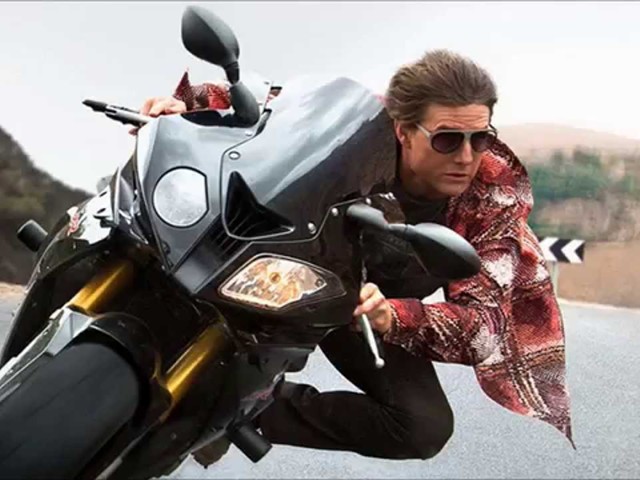In the summer of a year already shaken by violence and division, two men, each the unofficial figurehead for an ideological movement, distilled the unrest of the day into a verbal battle that began with forced politeness and ended in an explosion of angry threats that made television history and forever altered the reputations of the combatants.
In the summer of a year already shaken by violence and division, two men, each the unofficial figurehead for an ideological movement, distilled the unrest of the day into a verbal battle that began with forced politeness and ended in an explosion of angry threats that made television history and forever altered the reputations of the combatants. ABC was the lowest rated of the three major television networks when it made the decision to drop gavel-to-gavel coverage of the 1968 presidential conventions in favor of a two-hour prime-time digest of each day’s events, highlighted by a impromptu discussion by two outspoken figures, the conservative author and editor William F. Buckley Jr. and novelist, playwright and cultural critic Gore Vidal. Things did not go smoothly. The Best of Enemies is a sharp, informed documentary about Buckley and Vidal and the political and media climates that led to their debates. With a wide range of historical material and a restrained amount of contemporary talking-head footage (a handful of TV news executives, Vidal and Buckley experts and big-name guest stars such as Dick Cavett, Andrew Sullivan and the late Christopher Hitchens), it’s an entertaining and ambitious cultural history that deftly works its way through a considerable amount of background material. Viewers who have never heard the phrase “Huntley-Brinkley” will learn a great deal about the media and the way it treats politics, and even more about the two public figures at the center of the storm. (There are also readings from both men’s writings by Kelsey Grammer and John Lithgow, the former doing a reasonably good impression of Buckley). Was theirs match made in media heaven, or one destined to explode? (And does media heaven even make a distinction?) Buckley and Vidal were both famous, blessed with sharp wits, confident of their debating skills and absolutely convinced of their superior intellect. (Coincidentally, both had also recently failed in their only attempt to achieve political office.) Buckley, as founder and editor of the National Review, was the central figure in a rising movement that was re-shaping the Republican party, and he reached a wide audience as host of the talk show Firing Line. Vidal had established himself as the author of the topical political play The Best Man, but was currently riding high on the bestseller list with Myra Breckinridge, a brilliant and notorious comic novel about movie fandom and sexual identity. (Best of Enemies does Vidal a disservice by using the notoriously bad film version of the novel released two years after the debates as a means of illustrating Vidal’s work. The opportunity to show Raquel Welch in Vegas cowgirl garb was evidently impossible to resist.) From all indications, Buckley and Vidal despised each other even before they sat down for their first encounter. Vidal’s dislike of Buckley was largely political; he saw the rising strain of Buckley-influenced conservatism that had launched Barry Goldwater’s campaign and made a rising star out of Ronald Reagan as a genuine threat to democracy. Buckley, on the other hand, saw Vidal not as an ideological threat but as a moral one, a living, breathing testament to decadent, liberal immorality. ABC’s original intention was to have the two men offer opposing sides to the issues of the day, moderated by host Howard K. Smith. That plan lasted less than two minutes. By the time Buckley and Vidal returned for their second week, they were determined to destroy each other. As violence raged in the streets of Chicago around them and delegates and reporters were maced by police, Buckley and Vidal seemed equally disinclined to restrain themselves, and things came to a head in the penultimate debate. Vidal called Buckley a “pro-crypto Nazi” and Buckley responded by calling Vidal “you queer” and threatening, “I’ll sock you in the goddamned face, and you’ll stay plastered.” The rules of debate may have been discarded, but media and political history had been made. Rather than simply describe what could easily have been brushed off as a footnote, The Best of Enemies shows how the Buckley/Vidal debates became more than just a televised event and continued to haunt — or even obsess — both men for much of their lives. Though the film is unfailingly fair and balanced and doesn’t go so far as to label Vidal the winner of the debates, it leaves no doubt that Buckley was the loser. The man whose public image was built on an unshakeable cool lost it on national television, reduced to name-calling and playground threats. His efforts at damage control in the form of a followup essay for Esquire only seemed to embarrass him further, and according to witnesses in the film, he remained embarrassed about the debates for years. (Vidal relished the publicity and cultivated a hatred of Buckley up to the latter’s death in 2008, even publishing a tactless obituary of his nemesis.) The Best of Enemies looks at a different era in American culture, a time when a public intellectual could actually have influence, but it also warns that any influence can be twisted or distorted by the spectacle-driven media. For better or worse — no, make that for better and worse — the exchanges between Vidal and Buckley had an enormous impact on politics, television and the way both of those forms of entertainment have worked together in the decades since. Whatever positions they may have been arguing, the unfortunate outcome is that people — especially those in the news business — remembered the outbursts more than the ideas behind them. Almost half a century later, the arguments haven’t gotten smarter. They’ve only gotten louder. The Best of Enemies Directed and written by Robert Gordon and Morgan Neville. Starring William F. Buckley, Gore Vidal, Kelsey Grammer and John Lithgow. Opens Friday, August 21, at the Landmark Plaza Frontenac Theatre, 1701 South Lindbergh Boulevard, Frontenac. Call 314-995-6285 or visit www.landmarktheatres.com.ABC was the lowest rated of the three major television networks when it made the decision to drop gavel-to-gavel coverage of the 1968 presidential conventions in favor of a two-hour prime-time digest of each day's events, highlighted by a impromptu discussion by two outspoken figures, the conservative author and editor William F. Buckley Jr. and novelist, playwright and cultural critic Gore Vidal.
Things did not go smoothly.
The Best of Enemies is a sharp, informed documentary about Buckley and Vidal and the political and media climates that led to their debates. With a wide range of historical material and a restrained amount of contemporary talking-head footage (a handful of TV news executives, Vidal and Buckley experts and big-name guest stars such as Dick Cavett, Andrew Sullivan and the late Christopher Hitchens), it's an entertaining and ambitious cultural history that deftly works its way through a considerable amount of background material. Viewers who have never heard the phrase "Huntley-Brinkley" will learn a great deal about the media and the way it treats politics, and even more about the two public figures at the center of the storm. (There are also readings from both men's writings by Kelsey Grammer and John Lithgow, the former doing a reasonably good impression of Buckley).
Was theirs match made in media heaven, or one destined to explode? (And does media heaven even make a distinction?) Buckley and Vidal were both famous, blessed with sharp wits, confident of their debating skills and absolutely convinced of their superior intellect. (Coincidentally, both had also recently failed in their only attempt to achieve political office.) Buckley, as founder and editor of the National Review, was the central figure in a rising movement that was re-shaping the Republican party, and he reached a wide audience as host of the talk show Firing Line. Vidal had established himself as the author of the topical political play The Best Man, but was currently riding high on the bestseller list with Myra Breckinridge, a brilliant and notorious comic novel about movie fandom and sexual identity. (Best of Enemies does Vidal a disservice by using the notoriously bad film version of the novel released two years after the debates as a means of illustrating Vidal's work. The opportunity to show Raquel Welch in Vegas cowgirl garb was evidently impossible to resist.)
From all indications, Buckley and Vidal despised each other even before they sat down for their first encounter. Vidal's dislike of Buckley was largely political; he saw the rising strain of Buckley-influenced conservatism that had launched Barry Goldwater's campaign and made a rising star out of Ronald Reagan as a genuine threat to democracy. Buckley, on the other hand, saw Vidal not as an ideological threat but as a moral one, a living, breathing testament to decadent, liberal immorality.
ABC's original intention was to have the two men offer opposing sides to the issues of the day, moderated by host Howard K. Smith. That plan lasted less than two minutes. By the time Buckley and Vidal returned for their second week, they were determined to destroy each other. As violence raged in the streets of Chicago around them and delegates and reporters were maced by police, Buckley and Vidal seemed equally disinclined to restrain themselves, and things came to a head in the penultimate debate. Vidal called Buckley a "pro-crypto Nazi" and Buckley responded by calling Vidal "you queer" and threatening, "I'll sock you in the goddamned face, and you'll stay plastered." The rules of debate may have been discarded, but media and political history had been made.
Rather than simply describe what could easily have been brushed off as a footnote, The Best of Enemies shows how the Buckley/Vidal debates became more than just a televised event and continued to haunt -- or even obsess -- both men for much of their lives. Though the film is unfailingly fair and balanced and doesn't go so far as to label Vidal the winner of the debates, it leaves no doubt that Buckley was the loser. The man whose public image was built on an unshakeable cool lost it on national television, reduced to name-calling and playground threats. His efforts at damage control in the form of a followup essay for Esquire only seemed to embarrass him further, and according to witnesses in the film, he remained embarrassed about the debates for years. (Vidal relished the publicity and cultivated a hatred of Buckley up to the latter's death in 2008, even publishing a tactless obituary of his nemesis.)
The Best of Enemies looks at a different era in American culture, a time when a public intellectual could actually have influence, but it also warns that any influence can be twisted or distorted by the spectacle-driven media. For better or worse -- no, make that for better and worse -- the exchanges between Vidal and Buckley had an enormous impact on politics, television and the way both of those forms of entertainment have worked together in the decades since. Whatever positions they may have been arguing, the unfortunate outcome is that people -- especially those in the news business -- remembered the outbursts more than the ideas behind them. Almost half a century later, the arguments haven't gotten smarter. They've only gotten louder.
The Best of Enemies Directed and written by Robert Gordon and Morgan Neville. Starring William F. Buckley, Gore Vidal, Kelsey Grammer and John Lithgow. Opens Friday, August 21, at the Landmark Plaza Frontenac Theatre, 1701 South Lindbergh Boulevard, Frontenac. Call 314-995-6285 or visit www.landmarktheatres.com.






